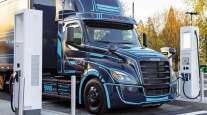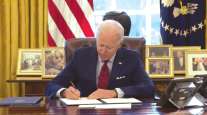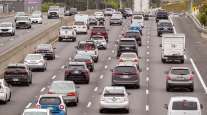Trudeau Imposes Carbon Tax, With Rebates, on Four Provinces

Justin Trudeau is imposing a carbon tax on provinces that have balked at implementing their own, doubling down on what is set to be a core fight of Canada’s next election.
Trudeau announced a plan Oct. 23 to tax industrial emitters and fuels in holdout provinces. The fuel surcharge alone will raise about C$2.3 billion ($1.8 billion) in revenue next year, rising to C$5.6 billion by 2022-23. The baseline price on carbon will be C$20 per metric tonne initially, rising to C$50 by 2022.
Much of the revenue will be sent directly back to individuals, and the government projects that the average household will receive more in rebates than it pays in the tax.

Prime Minister of Canada, Justin Trudeau. (Ben Nelms/Bloomberg News)
The plan will apply to Ontario, Saskatchewan, Manitoba and New Brunswick. The charge on large industrial emitters will begin in January, though revenue details have yet to finalized, while the fuel tax will take effect in April. Some of those provinces are challenging the prime minister’s authority in court.
“A number of the provinces have refused to do that, so because pollution doesn’t stop at provincial borders, we’re going to move forward with a federal approach,” Trudeau told CBC Radio before the announcement. “People will be better off, families will be better off because of the carbon incentive we’re returning to them.”
Electoral Battle
The file will be a central battleground of Canada’s next federal election one year from now. Trudeau faces growing opposition, particularly among the country’s conservative parties, to any carbon tax or cap-and-trade system. He announced the move in a Toronto suburb that is home to Ontario Premier Doug Ford, who scrapped the cap-and-trade system in Canada’s most populous province after being elected earlier this year.
The average household cost of the plan will range from C$202 to C$403 annually starting in 2019, depending on province, while the average household rebate will range from C$248 to C$598. The C$20 per tonne initial charge is the equivalent of 4.42 Canadian cents per liter on gasoline.
About 90% of fuel charge revenue will be returned to individuals, and the rest to cities, small businesses and institutions such as schools. Each industry will have an emissions target that is 20% less than its current average, and companies can sell credits to others.
Canada will provide C$1.5 billion over five years in “support” for small- and medium-size businesses as part of the plan, along with C$707 million for universities, hospitals and other institutions.
‘Revenue Plan’
A carbon tax is not an environmental plan. It is a revenue plan.
federal Conservative Leader Andrew Scheer
All four provinces where the plan is to be imposed are either governed by conservatives, or may soon be. Other provinces, such as British Columbia, have introduced their own plans that meet the federal standard.
“A carbon tax is not an environmental plan. It is a revenue plan,” federal Conservative Leader Andrew Scheer said over the weekend, during a campaign-style speech to supporters. He would kill the carbon backstop if elected next year. “It is a tax no matter what they try to call it, and we will scrap it.”
Trudeau struck a political tone Oct. 23 in the radio interview. “We are not going to allow pollution to be free, even if conservatives want to make pollution free again,” the prime minister said.
The fate of emissions policy in Canada’s heaviest emitter, Alberta, remains unclear — Premier Rachel Notley has implemented her own climate plan, but polls show she could lose power in the oil-producing province next year. Her top rival has joined with Ontario’s premier in criticizing Trudeau’s plan.





